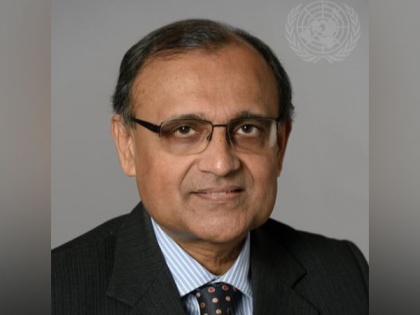'Country will always support serious climate justice', Tirumurti after India rejects UNSC draft resolution
By ANI | Published: December 13, 2021 11:33 PM2021-12-13T23:33:27+5:302021-12-13T23:40:07+5:30
India on Monday voted against a draft resolution of the United Nations Security Council that attempted to "securitise" climate action and undermine the hard-won consensual agreements in Glasgow.

'Country will always support serious climate justice', Tirumurti after India rejects UNSC draft resolution
India on Monday voted against a draft resolution of the United Nations Security Council that attempted to "securitise" climate action and undermine the hard-won consensual agreements in Glasgow.
India's Permanent Representative to the United Nations TS Tirumurti said that the country will always speak up for the interests of the developing world and had no option but to vote against the draft.
Tirumurti said that India is second to none when it comes to climate action and climate justice but the UN Security Council is not the place to discuss either issue.
"In fact, the attempt to do so appears to be motivated by a desire to evade responsibility in the appropriate forum and divert the world's attention from an unwillingness to deliver where it counts," he said.
He also spoke against drawing a separate link between security and climate change.
"India now ranks fourth in the world in installed renewable energy capacity. India's non-fossil fuel energy has increased by more than 25 per cent in the last 7 years and has reached 40 per cent of our energy mix. Along with this, India has also given institutional solutions to build cooperation at the international level. We initiated the International Solar Alliance and the Coalition for Disaster Resilient Infrastructure," Tirumurti said.
Further, the Ambassador mentioned that there should be no confusion about India's determination to combat climate change. "We will always support real climate action and serious climate justice," he said.
"We will always speak up for the interests of the developing world, including Africa and the Sahel region. And we will do so at the right place, the UNFCCC," he said.
He also pointed out that the developed countries had fallen short of their promises and that they should provide climate finance of $1 trillion at the earliest.
Parties to the UN Framework Convention on Climate Change had adopted the Glasgow Climate Pact, agreeing to phase out inefficient fossil fuel subsidies and phase down unabated coal power.
Also, the Glasgow Climate Change Conference (UNFCCC COP 26) closed on the night of November 13, one day later than planned and it was convened from October 31 to November 13, this year.
The draft resolution of the United Nations Security Council co-authored by Ireland and Niger states that the adverse effects of climate change can "lead...to social tensions..., exacerbating, prolonging, or contributing to the risk of future conflicts and instability and posing a key risk to global peace, security, and stability".
Further, Ireland and Niger circulated a zero draft of the resolution following a September 23 high-level open debate on climate and security which was organised by Ireland.
Also, the co-penholders apparently based their text on a draft resolution which was proposed in 2020 by then-Council member Germany in cooperation with nine other Council members. A vote on that draft text was not held because of strong resistance from China, Russia and the US.
Meanwhile, one round of negotiations was held on October 11 in which Estonia, France, Ireland, Kenya, Mexico, Niger, Norway, Tunisia, Saint Vincent and the Grenadines, the UK, the US, and Viet Nam--expressed support for a more systematic integration of climate-related security risks into the Council's work, requesting only minor adjustments to the zero draft. China, India and Russia, however, apparently expressed deep scepticism about the need for Council engagement on this issue.
( With inputs from ANI )
Disclaimer: This post has been auto-published from an agency feed without any modifications to the text and has not been reviewed by an editor
Open in app